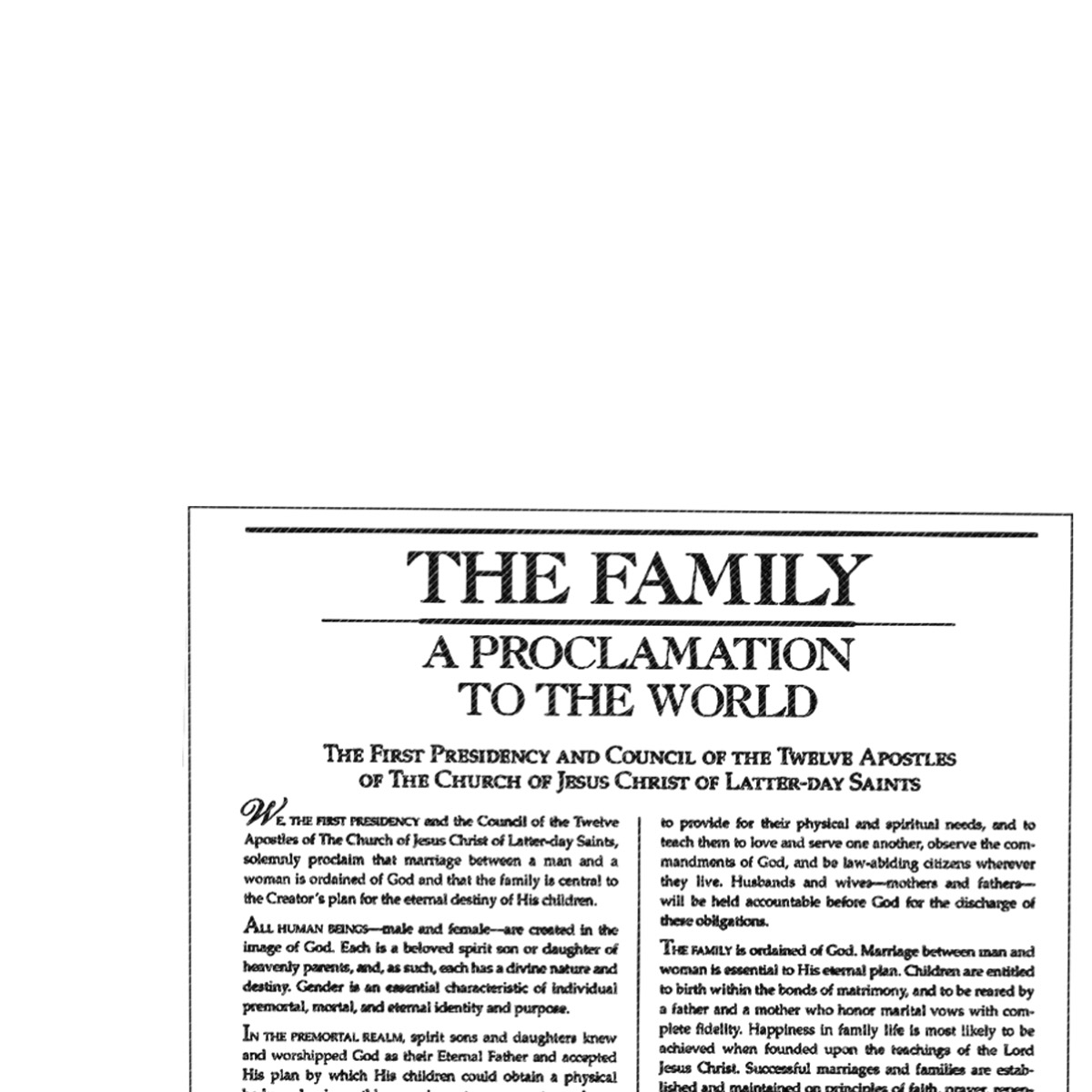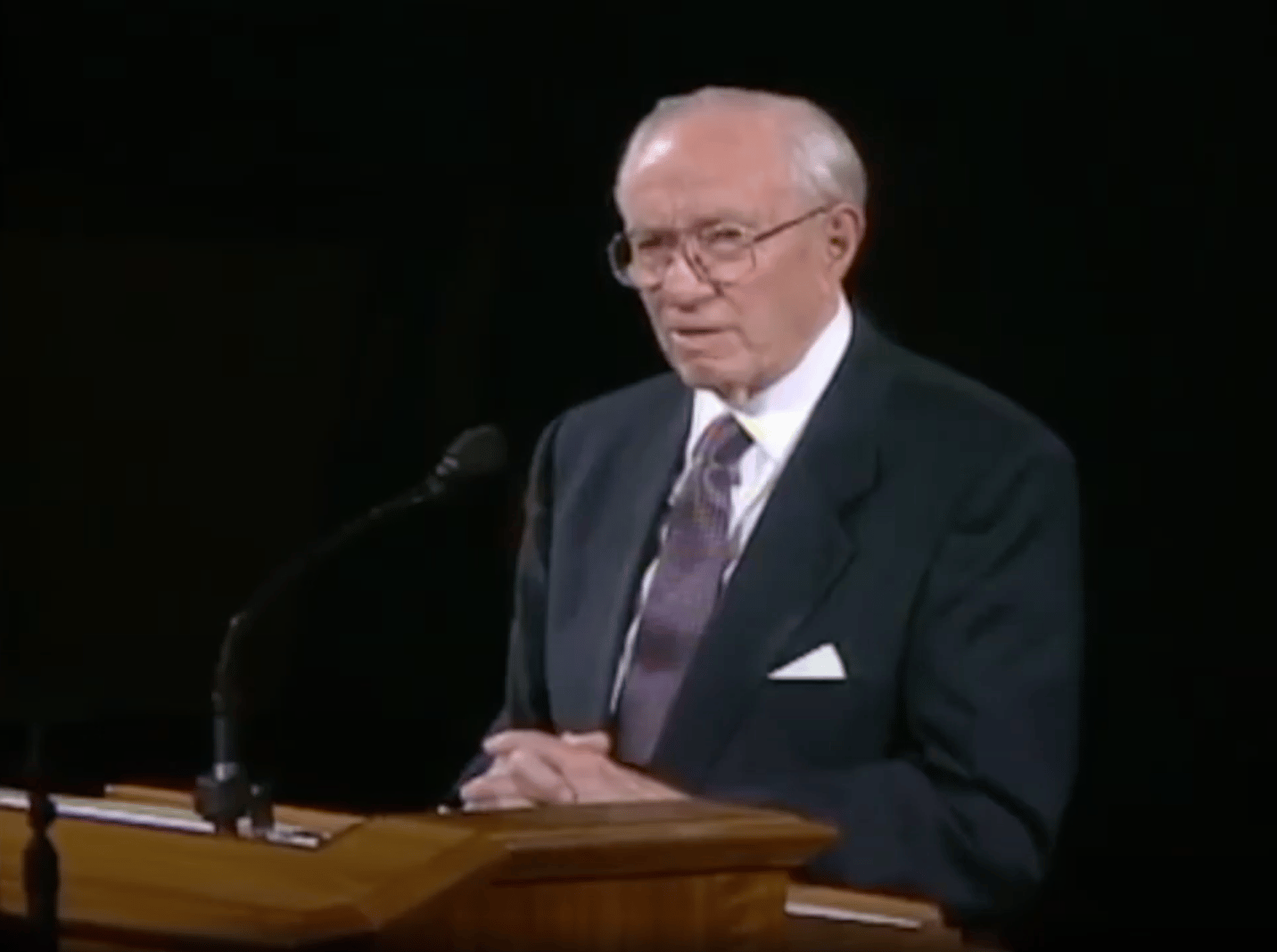The Family Proclamation

What is the family proclamation?
“The Family: A Proclamation to the World” is a statement issued by the First Presidency and Quorum of the Twelve Apostles outlining Church teachings on family, parenting, gender, and marriage.[1] It was presented by President Gordon B. Hinckley during the General Relief Society Meeting of General Conference on September 23, 1995.[2]
The Church has issued six proclamations throughout its history, this being the fifth.[3]
Who wrote the family proclamation? Did attorneys write it to support the fight against gay marriage in Hawaii?
No, but sort of yes. It was not written by the Church's attorneys,[4] but it was used in the 1993 Hawaii Supreme Court case on gay marriage, known as Baehr v. Lewin (later Miike).[5] In 1994, members of the Quorum of the Twelve began writing the proclamation in a "revelatory process,” with revisions by the First Presidency.[6][7]
The Hawaii legal case likely prompted the need to articulate these principles in one place.[8]
Was it used directly in the Hawaii gay marriage case?
Yes. The family proclamation was included as an appendix to an amicus curiae brief filed by the Church in Baehr v. Miike in 1997, which included legal arguments against same-sex marriage.[9]
Was the proclamation on the family really inspired if it might have been written to fight gay marriage in court?
Yes, probably. Revelation is often catalyzed by pressing questions or issues.[10] Elder Dallin H. Oaks,[BIO] who helped produce the proclamation, described the writing process as revelatory and inspired.[11] Elder Russell M. Nelson,[BIO] who also helped write it, said that they foresaw the issues that were coming.[12]
Apostles at the time of the proclamation’s production have described it as “inspired,”[13] “prophetic,”[14] “a revelation,”[15] and “eternal truth, the will of the Lord for His children.”[16]
But wasn’t the proclamation on the family written by a BYU law professor?
No, probably not. Initial drafts of the family proclamation were written by members of the Twelve[17] after the initial suggestion by President Boyd K. Packer.[BIO] Lynn Wardle,[BIO] a BYU law professor known for his opposition to gay marriage, consulted[18] on the Church filing in Hawaii's Baehr v. Miike case.[19]
Wardle could have consulted in drafting the family proclamation, but there is no evidence to support this.
Did any women general authorities participate in writing the proclamation?
No. In a 2005 interview, Sister Chieko Okazaki[BIO] said it was written without any input from the women in Church leadership and asked, "How come we weren't consulted?"[20][21]
However, the First Presidency met with the Relief Society General Presidency and discussed the timing of when the proclamation would be presented, and the decision was made to present it during the 1995 General Relief Society meeting.[22][23]

Does the proclamation have any new ideas or doctrines in it?
Not really. It's more of a compilation of teachings that have been taught for many years within the Church.[24] The Church has articulated the key principles found in the proclamation as far back as 1831.[25]
Is the family proclamation official doctrine?
Yes. It's a formal statement issued by the First Presidency and Quorum of the Twelve Apostles.[26][27] Since its publication, Church leaders have consistently taught and shared it.[28] In 2025, Elder Ronald A. Rasband[BIO] said the "proclamation on the family is, as President Hinckley stated, doctrine, my dear brothers and sisters."[29][30]
However, the proclamation has not been canonized by the sustaining vote of the Church.
Is the family proclamation sexist?
Arguably. It describes different roles for men and women within the family. Men are to “preside” and “provide the necessities of life and protection,” while women are "primarily responsible for the nurture of their children."[31][32] They are to “help one another as equal partners.”[33][34]
Church leaders teach that men and women are equal partners in raising families.[35][36] Additionally, the family proclamation allows for "individual adaptation" as circumstances require.[37][38]
Is the family proclamation only about same-sex marriage and gender roles?
No, it is intended to address a broad range of topics related to the family. This includes our divine origins with Heavenly Parents, gender, marriage between a man and a woman, eternal families, temple covenants, the sanctity of life, parental responsibilities, gender roles, and a warning against domestic abuse.[39]
When introducing the proclamation, President Hinckley mentioned out-of-wedlock births, single motherhood, welfare dependency, same-sex marriage, violence in the media, and adherence to civil laws, among other things.[40]
Related Question
Does the Church contribute to a higher suicide rate in LGBTQ+ people?
Read more in LGBTQ+ and Suicide Rates
How does the Church define “gender” in the proclamation?
The Church Gospel Library states that the "intended meaning of gender in 'The Family: A Proclamation to the World' is biological sex at birth."[41]
Have any of the "calamities" that are mentioned in the proclamation happened?
Maybe?[42] Ancient and modern prophets have foretold of all sorts of calamities,[43] and they are often vague or symbolic in nature.[44] On an individual basis, Church leaders have occasionally drawn links between the family proclamation and calamities.[45] Institutionally, the Church generally avoids assigning causes to specific disasters.
- Lucius
“I don't understand why some people are upset that the General Relief Society wasn't "consulted" during this process. They are important in the church, but aren't Apostles of Jesus Christ who receive revelation for the Church. These concerns are misguided.” - Dallin
“The thing that's always tripped me up about the proclamation is the use of the word "Gender." Why use that word if the Church is going to double back and say they meant biological sex? I feel like there has to be something to the word if they were inspired to use it.” - Kathleen N.
“As a member who believes in gender equality, your last paragraph is disappointing in that Heavenly Father reveals truth and Heavenly Parents (HM) provide love. This is right down the proclamation gender lines. Fathers lead, mothers nurture. You can do better than that.” - Kathryn
“The proclamation outlines what a family "should" look like. So many families don't look like that, or operate in accordance with the roles listed. It's exclusionary, harmful, and outdated. No women were consulted in its making or even knew it was being drafted.” - woo
““Was the proclamation on the family written by attorneys to support the fight against gay marriage in Hawaii?“ Really this is two questions… but on the first it may be worth noting that two of the signatories were indeed lawyers, President Faust and Elder Oaks.”



 about this topic
about this topic